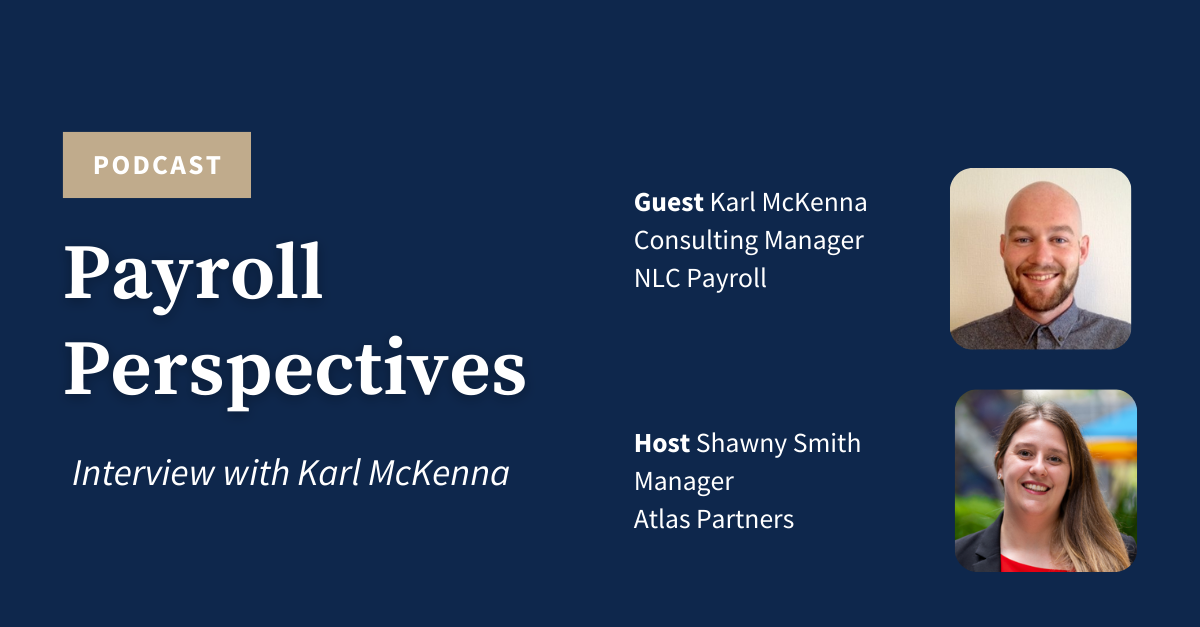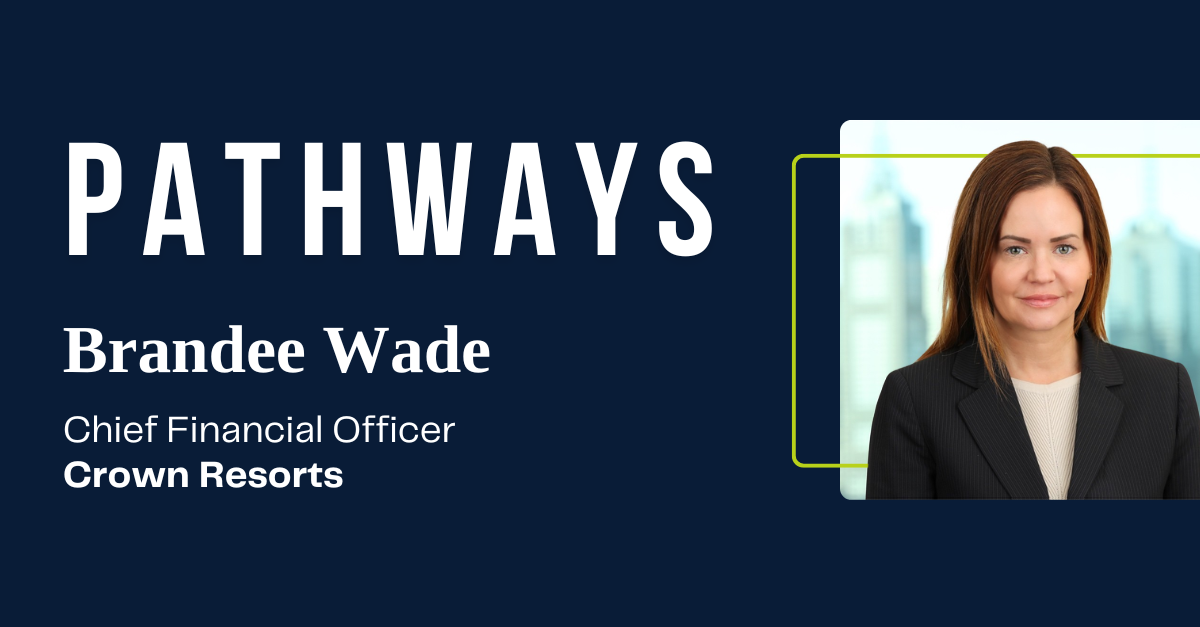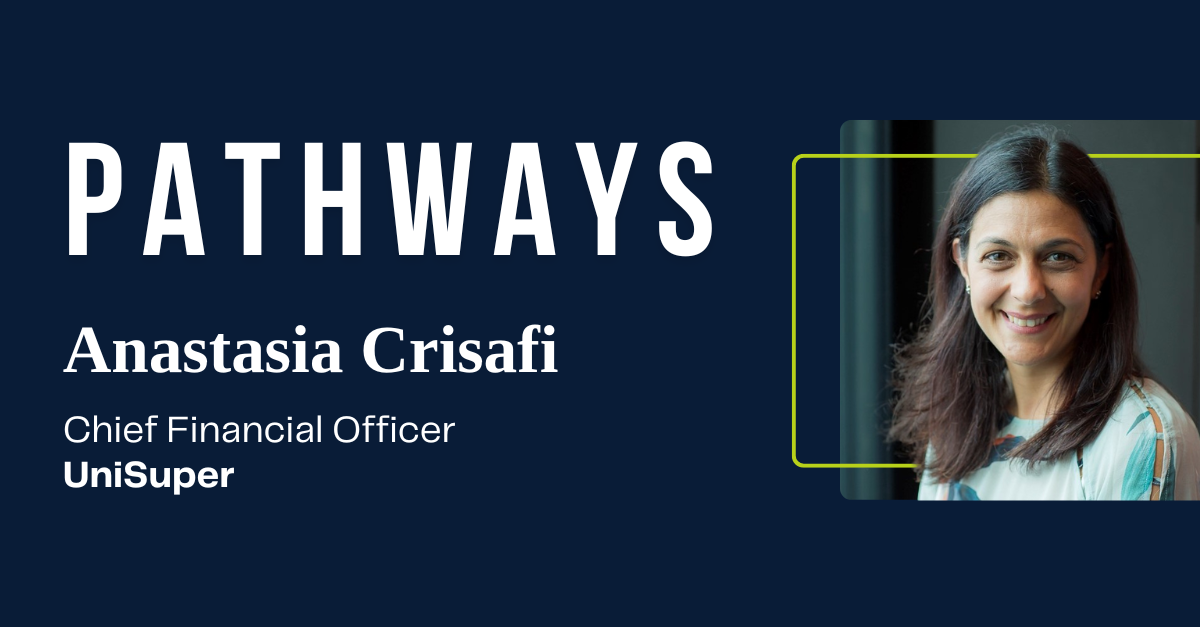
Payroll Perspectives — Karl McKenna, NLC Payroll
Combine English teaching, Japan, MYOB, and the business opportunity of a lifetime — and you can get a very unexpected career pivot into Payroll. Karl McKenna, Consulting Manager for NLC Payroll chats to us about the other side of payroll, outsourced teams, and how he’s seen the industry change in the last decade, in his chat with Shawny Smith, for Payroll Perspectives.
Shawny: Hi, Karl. Thanks for joining me for an episode of the Payroll perspective. So, yeah, let’s just start off with, if you can introduce yourself and give us an overview of your career and life at NLC.
Karl: Yeah, cool. I’m Karl McKenna. My role at the moment is as a consulting manager. So I’m managing a team of nine or ten consultants and three developers. And I took the, well, I’ll take a step back. You probably don’t meet many people that, you know, dreamed of becoming a parallel person. That’s not, you know, it’s not something that you set your eyes on when you’re in high school or college or whatever. But I was over in Japan teaching English, and my in-laws were approached by MYOB, to purchase the outsourced payroll for pay global, one of the payroll systems. And we ended up doing that. And I moved from Japan, where I was teaching English, back to Wellington and New Zealand, and the rest is history. So we had an outsourced payroll team. There’s a few of us that’s grown substantially in size, and I’ve moved over into payroll consulting and leading that team.
Shawny: I noticed that you’d been there for nine years, obviously since its conception. So how’s your role changed in that time?
Karl: Yeah, so as a family business, it’s pretty easy to, it’s kind of like tumbleweed. You just sort of pick up roles as you go and sometimes you end up keeping some of them. And I’ve had a brief stint of working in the outsource payroll team, actually processing the pays, managing it for a short period of time, doing account management and sales for the whole business, picked up a little bit of the marketing side of the business and haven’t really dropped that. Or maybe in the last couple of years I have through to doing actual consulting work and implementations to now managing that team. I still do a lot of the sales work. We don’t have a, a salesperson. We have a lot of leads that come our way that we did sort of manage and deal with that way. So I think that the family business side of it is meaning that you basically end up with a few different roles. They all come into one, you don’t have the right job title, so to speak. But my first and foremost role at the moment is managing the consulting team and all of the projects that we’re doing in that space.
Shawny: Yeah, I can definitely see that over the years you haven’t really lost much, you’ve just kind of gained more, which does definitely happen.
Karl: That’s the case. That’s the case for all of us in the family as well.
Shawny: Perfect. So I suppose obviously it’s a family run business, so that definitely is a key factor in your love and passion for it. But what has kept you around for the nine years, and what is it specifically about payroll that you love?
Karl: Yeah, I think that’s changed. I could say maybe matured. Matured with me. But what I really love now is, is the complex problems like helping a business fit their requirements and their business processes into what’s compliant that. A lot of businesses don’t want to change what they’re doing, but obviously they want to be compliant. So how do you make that work? What tools do they need? Is it the fact that the system that they’re using isn’t going to be the right system moving forward? Is there something that can supplement it rather than a full change and having those really long winded conversations around the parts of compliance that might be a little bit more grey or up to open to interpretation and trying to work out exactly where that line is sprinkled with a bit of legal assistance or sign off. And those conversations I really like. And then after that, probably implementations and big scale implementations where you can see the magnitude of that change and how much business process and how much adoption there needs to be at a business through change management and whatnot, especially if there’s hras on top of payroll going in.
Shawny: Yeah, definitely. Those projects elements, always something that people have passion for when they get to that sort of mid to late career. I say they’ve been in payroll for a big chunk of time. You mentioned the different clients that you work with. Is there a specific type of industry that you seem to work with more or that the system sort of suits more?
Karl: Not necessarily, no. We’ve got, we’ve got two different distinct parts to the business. We’ve got our general consulting, and then we’ve got our outsourced payroll. And in the outsourced payroll, it’s really industry agnostic. We don’t really work with one over another. It’s, you know, potentially some industries might favour outsourcing their payroll more than others. I haven’t really noticed that. You know, we’ve got retail, we’ve got hospitality, we’ve got manufacturing, things like that. So we’re covering, you know, a decent, a decent range of industries. I’d say more. It’s a business by business. You know, the concept of outsourcing your payroll can be quite scary. You’ve always had someone you can walk up to, or, you know, your staff can walk up to. I find probably more in that waged weekly paid, you know, complicated payrolls. They like having someone there in person. And so some, sometimes we’ve worked in those industries and with those businesses, and I, we’re doing all of the work in the background, and then, you know, they’ve got someone who, you know, knows the business and knows the people, and they’re this smiley face, you know, on the, on the ground, so to speak.
Shawny: Yeah. Honestly, I’ve worked with many different businesses and recruited for many different businesses in outsourced and obviously in house as well, and plenty of conversations with different leaders about what, what’s better or what suits their business. And, and sometimes they go through cycles of outsourcing and bringing it in here. So it is very interesting to hear your thoughts on it as well, that it’s a little bit of that scary element, not having someone on the ground for people, but finding a good partner definitely benefits an organisation as well.
Karl: Yeah, we had a client recently where they literally have a window that you can walk up to and slide open, and the payroll team are behind it. And so we’re doing payroll for them, but they still have some of their administrative team sitting in that office where someone can walk up to and sort of slide open the payroll window and ask a question about their pay slip.
Shawny: I love that. It’s like a little drive through for payroll.
Karl: This is where all the wizards hang out.
Shawny: Exactly. The payroll wizards. So, again, speaking more about the outsourced side thing, what’s the biggest challenge that you find working an outsourced provider versus an in house?
Karl: Yeah, I think there’s a few. I’ll stick to a couple of them. I think from a contract and management perspective, it was difficult initially for us to keep a really clear handle on the scope of services that we were providing. Clear line in the sand, so to speak. And that really became for us what is now called our virtual payroll, where we sort of open that up into a, you know, you’ve got an expectation of an outsourced payroll provider being the same as if you had someone sitting there and they could do this random report or go and run this thing for you. And our previous service models were a lot more, we’re going to do this, you’re going to do that, we’re going to do this, you’re going to do that. So we’ve made a lot of change in the last couple of years towards that virtual model, being we are essentially your in house payroll team, but we’re just not there. And we’ve seen that work quite well. And we’ve got funny stories from companies where, because we’re managing the payroll from a mail address, people will walk up to the finance team or the people and culture team, HR team, and be, oh, I’m looking for Karl. I’ve been emailing Karl and a payroll and everyone sitting there like, we don’t have a Karl on the team. And then they work back and realise that they’re talking about us at NLC. So from their perspective, that works really well, that the employee is feeling like they’re still talking internally. They’re not disconnected from the culture of the business or anything like that. So that was a big one for us.
Shawny: It sounds like you have approached that challenge with a very smart mind to. Not that you’re tricking people into thinking that you’re there, but you’re making it seamless so that it does feel like they’re getting the same support or same help as if you were there on site as well.
Karl: Yeah, that’s right. And I think that’s one of the expectations of the client when they’re looking to engage with us, is what that employee experience is. People have, rightly or wrongly, negative perceptions of outsourcing. That it’s really, there’s a lack of personality and disconnect from the business. You know, we’ve tried to challenge that and make it a bit more, you know, a bit more connected. And I’d say probably the last, the last thing that I was gonna raise around the challenges is from a hiring perspective. You know, we’ve got, we’ve got very clear ways around how we like to do things and how we operate and how we train and how we on board. So hiring has always been a challenge in the sense of trying to find the right person. It’s always been a person at first, but then I trying to bring in someone with the right level experience, but not too much experience so you don’t have to unteach them things before teaching them how we do things. That’s probably the other challenge.
Shawny: Do you find that you have more success with people that have experience in other outsourced providers or just with any sort of type of initial payroll experience?
Karl: Yeah, we’ve, we’ve hired well across from some other outsource payroll providers and they’ve integrated into the team well. I think that there’s a big difference between running, running sole charge person. They’ve just sat there and run their 300 employee pay or whatever it is week in, week out, they’ve got their set routine to them turning up and having ten or 15 different companies that you run pays for, but you’re doing it with other people in the team and you’ve got to share this role and that role. So, yeah, that’s where people fit, I guess, comes into it.
Shawny: Yeah, it’s definitely more collaborative and I suppose the high level of multitasking, because you do have multiple different stakeholders all needing the same kind of level of service, possibly all needing something urgent last minute.
Karl: Yes, that’s right. Yeah. Everything’s, everything’s always urgent and you’ve always got a couple of minutes, a couple of minutes to get it done. So keeping people that have been with us for a while are super used to it. I think there’s a shock to the difference in how outsource payroll works to being a sole charge payroll person or in a small team, but not that it’s a bad challenge, it’s just a different way to work.
Shawny: Perfect. Cool. The next question is actually a little bit around AI. I know it’s a hot topic in payroll and just across the the market in general, what impacts have you seen from the introduction of AI and payroll?
Karl: Yeah, I think it’s scary, right? Like, I think that there’s going to be a long time, there’s going to be a long time for people to gain, you know, the right level of trust for AI and payroll to be, you know, intertwined. But I think we will see good impact of AI in parts that impact payroll, just probably not in terms of decision making, I’m assuming. I think the things that I’ve seen and things that I’ve gotten excited about AI helping with workforce management and getting really good rostering patterns sorted, or finding the right people for roles, working out good analytics around peaks and troughs for businesses that you’re over hired here or you’ve got too many people on the books. So we’re going to predict that next time around it’s going to be a bit less requirement for resources. You only need three people at that time of the day. Great for analytics. That’s one of the best things that AI can do is pattern recognition and working things out for you. You can see in both New Zealand and Australia great reporting opportunities and have seen that with regards to payroll trends, variance reporting and other such things within the pay, I think we’re some time away from it. Being involved in the pay run, where dollars are being calculated, actions are being done, but who knows, someone might do it and show us that it’s possible and people will start to gain that trust. I think people are always worried about where their data might go. Rightly so, obviously. Rightly so, but worried about where the data is and what’s happening. And for as long as you can ask Google if it’s a good idea to add glue to pizza to make it a bit more stringy and it agrees with you, then I think that they’re probably not going to, they’re not going to want to get payroll involved with AI at that decision or that financial level.
Shawny: Yeah, I think it has a lot of implications when it comes to just keeping information confidential, which is a very key part of payroll. But I have seen, and I think I’m really hopeful for the future of payroll just because more of the mundane or analytical stuff can be taken over. Or at least you’ve got a second set of brains almost, where you can sort of bounce ideas off. And as long as you’re sort of keeping that confidential nature or you have your own system that you use with different firewalls or whatever else built in, it can definitely add a lot of value. And I think there has been people that I’ve discussed this with that little bit hesitant and scared about the future of payroll and what it means for their jobs or what it means for the industry, but I can’t see it changing anything drastically in the sense of what resources we would need. It’s just slightly changing the scope to hopefully be more interesting work.
Karl: Yeah, I completely agree. I think that the work that we do will just be enhanced by AI rather than replace. In that sense, you’re going to have way better view of your data or, you know, you’re spending less time adding employees. Like you’re saying, you know, if someone’s got this role, then they always have this cost center and this thing and this thing and this thing, you know, starting getting defaulted information sorted. Payroll is also pretty repetitive. You know, it’s pretty easy to predict what you’re going to be doing next Tuesday or next Wednesday or next Thursday. So, you know, having repeatable tasks managed is totally, totally doable.
Shawny: Yeah. And I think you’re always going to need the human element there. Even if I talk about the supermarkets, they’ve got cameras that are identifying the goods that you’re putting through and saying, hey, this isn’t an orange, this is a nectarine and it can be often wrong. So you still need that human element to be able to override what AI has decided to come up with or to at least do sense checks on it whatnot as well. Cool. And then the last one, I think we sort of spoke a little bit about sort of, you know, hiring for your team and the different skills attributes that you look for and how it’s different to an internal payroll person. But I suppose, is there anything else that you can expand on that in the sense of if you’re looking for people that don’t have the outsourced payroll experience or you can’t find anyone in that space, what else is it that you’re looking for?
Karl: Yeah, we’re always looking, and this is across the business. I think it’s a little bit to do with the small business. You know, we’re at about 35 people at the moment, I think, you know, so people fit. And getting the right person for the team is huge for us. That’s it. That’s really one of the first things that we’re looking at, because anyone without payroll experience can be taught it. So the first and foremost is how this person’s going to sit within our team. And then after that it’s, can they multitask? It’s, can they, you know, can they handle the peak and trough of high demand to nothing? You know, like, you know, five customers sending an email at the same time? You don’t have to do all five emails at the same time, but you’ve got that on the back of your mind, you know, like, you know, that that’s there. How are you going to handle that multitasking? You know, can you work really, really, really well as a team? Because that’s essentially where we’re at in terms of the main parts that lead to our success of being able to run whatever it is. 60, 70, 80 pays in a day for some companies across the different companies that we do pays for. It’s not achievable without that.
Shawny: Definitely. And in some ways, I actually find hiring for payroll similar. Like if I was to hire someone in recruitment or for my team, I find the key factor to success, which isn’t always easy to work out in an interview or initially, is actually the resilience and persistence to keep going through challenges or through those busy times and the flux, because it’s a little bit the same in recruitment. Sometimes you’re flat out and you just need to give, give, give, and then it sort of drops to the, to the other end where you’re sort of, you know, having to find things to do and way to impact the, the job. And things can go well and things cannot go well. So it’s up and down, so I think that’s why. That’s another reason why I love recruiting in that payroll space is just. It has a lot of similarities in the key attributes that you’re looking for.
Karl: Yeah, no, completely agree. Completely agree. There’s. Yeah, certain makes of people. Like I said earlier, I don’t think anyone ever set out to be a payroll person, but it finds you and then you’re like, wait, this is actually quite fun. You know, I like this. I like the.
Shawny: You were a teacher in Japan, or teacher, and when you got approached to come help the family business.
Karl: Hold on, hold on, hold on. Spending my time in the bustling metropolis of Tokyo, or let’s go and run some pays. Let’s go. I made my choice.
Shawny: Yeah. Most people that I speak to do say that they didn’t choose to be in payroll and they fell into it. And it’s interesting to hear everyone’s different stories about how that happened. But to be honest, I do think that’s also changed in the market. You know, there’s a lot more people doing payroll courses or whether they know someone who’s been in payroll or just because it’s been in the news and media a lot that, you know, payroll’s not gone right here or whatever.
Karl: That’s a really. That’s a really good point. That’s a really good point. I think that’s. That has, that has genuinely changed, all jokes aside, that it is more of a professional role now. It’s, I think, long gone are the job, the time where it was a job that was looked after by a receptionist or it was a part time, like you’re doing this, but you’re also a little bit of a bookkeeper. And when you’re doing that, and it’s actually a genuine role with a lot of responsibility and a lot of education and training. And I think that’s probably why a business that outsourced with outsourced payroll works so well nowadays is that people are realizing there’s a massive risk there and they want someone with that ongoing understanding of legislation, they’re up to date with regards to what’s happening and what’s changing, rather than it being one quarter of someone’s job and they’re worried about something else and then something else.
Shawny: Exactly. And the fact that you’ve got an outsourced provider, if someone did leave in your team, you’ve got the rest of the team there that know this business and can support risk there for their own internal talent, isn’t there?
Karl: Yeah, absolutely. Right.
Shawny: Well, look, that pretty much wraps up all the questions. So I really want to thank you a lot for joining me for the, uh, podcast and for answering all those questions. You know, definitely the first person that we’ve had come talk about, you know, outsource in such detail, and it’s. It’s been really exciting to hear a different perspective or insight as into payroll.
Karl: No, that’s been awesome. It’s been really fun for me. So thanks. Thanks for inviting me and having me.




